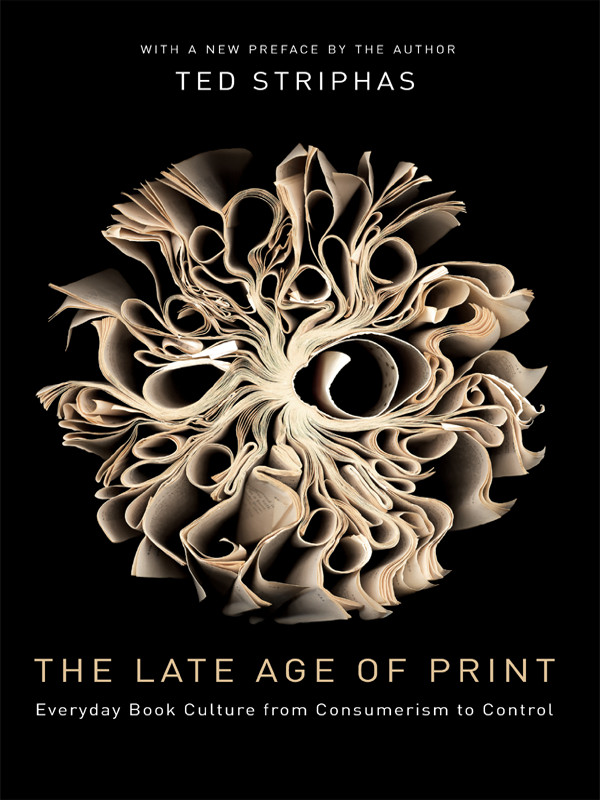Ted Striphas: The Late Age of Print: Everyday Book Culture from Consumerism to Control (2009)
Filed under book | Tags: · book, electronic literature, filesharing, literature, publishing

“Ted Striphas argues that, although the production and propagation of books have undoubtedly have entered a new phase, printed works are still very much a part of our everyday lives. With examples from trade journals, news media, films, advertisements, and a host of other commercial and scholarly materials, Striphas tells a story of modern publishing that proves, even in a rapidly digitizing world, books are anything but dead.
From the rise of retail superstores to Oprah’s phenomenal reach, Striphas tracks the methods through which the book industry has adapted (or has failed to adapt) to rapid changes in twentieth-century print culture. Barnes & Noble, Borders, and Amazon.com have established new routes of traffic in and around books, and pop sensations like Harry Potter and the Oprah Book Club have inspired the kind of brand loyalty that could only make advertisers swoon. At the same time, advances in digital technology have presented the book industry with extraordinary threats and unique opportunities.
Striphas’s provocative analysis offers a counternarrative to those who either triumphantly declare the end of printed books or deeply mourn their passing. He isolates the invisible processes through which books have come to mediate our social interactions and influence our habits of consumption, integrating themselves into our routines and intellects like never before.”
Publisher Columbia University Press, 2009
Creative Commons Attribution-Noncommercial-Share Alike 3.0 License
ISBN 0231148143, 9780231148146
242 pages
Interview with author: Henry Jenkins (2012, Part 2).
Reviews: Steven Poole (The Guardian, 2009), Vicky Gilpin (Southwest Journal of Cultures, 2009), Casey Brienza (Publishing Research Quarterly, 2009), Sarah Lowengard (Technology and Culture, 2010), Jeffrey St. John (Quarterly Journal of Speech, 2010), David Haeselin (Electronic Book Review, 2010), Laura J. Miller (Journal of Consumer Culture, 2010), Sean Johnson Andrews (Reviews in Cultural Theory, 2011).
Book website
Wikipedia
Publisher
WorldCat
PDF (11 MB, updated on 2020-5-19)
EPUB (18 MB, added on 2020-5-19)
Naomi S. Baron: Alphabet to Email: How Written English Evolved and Where It’s Heading (2001)
Filed under book | Tags: · language, language theory, linguistics, publishing, reading, writing

In Alphabet to Email Naomi Baron takes us on a fascinating and often entertaining journey through the history of the English language, showing how technology – especially email – is gradually stripping language of its formality.
Drawing together strands of thinking about writing, speech, pedagogy, technology, and globalization, Naomi Baron explores the ever-changing relationship between speech and writing and considers the implications of current language trends on the future of written English.
Alphabet to Email will appeal to anyone who is curious about how the English language has changed over the centuries and where it might be going.
Publisher Routledge, 2001
ISBN 0415186862, 9780415186865
Length 316 pages
Adrian Johns: The Nature of the Book: Print and Knowledge in the Making (1998)
Filed under book | Tags: · book, knowledge production, print, publishing

In The Nature of the Book, a tour de force of cultural history, Adrian Johns constructs an entirely original and vivid picture of print culture and its many arenas—commercial, intellectual, political, and individual.
Publisher University of Chicago Press, 1998
ISBN 0226401227, 9780226401225
753 pages
PDF (updated on 2013-6-5)
Comment (0)
